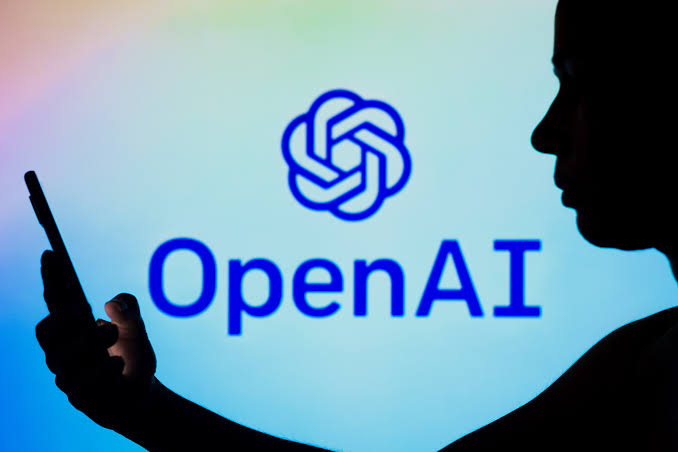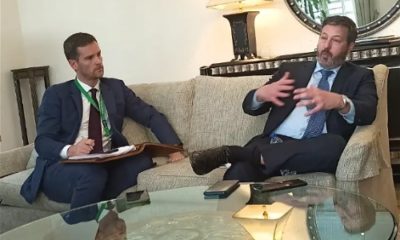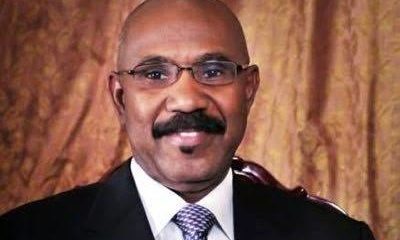Communication
OpenAI CEO Addresses AI Job Market Fears, Racism Concerns

On Friday, the CEO of OpenAI, the company responsible for the widely used ChatGPT bot, addressed concerns regarding the impact of artificial intelligence (AI) on the job market.
He reassured that OpenAI’s technology would not lead to the destruction of jobs, aiming to alleviate fears surrounding the advancement of AI.
During his global tour to engage with national leaders and influential individuals, Sam Altman, the CEO of OpenAI, made the statement in Paris emphasizing that artificial intelligence (AI) would not result in the complete elimination of entire job sectors through automation, contrary to some concerns raised.
Altman expressed his disagreement with the notion that AI would reach a stage where humans would no longer have any meaningful work or purpose, highlighting that such an idea has never resonated with him personally.
He said “This idea that AI is going to progress to a point where humans don’t have any work to do or don’t have any purpose has never resonated with me,”
When questioned about the media industry, which has witnessed the utilization of AI by various outlets to generate news stories, Altman remarked that ChatGPT should be seen as a tool that provides journalists with the support of 100 assistants, aiding them in research and idea generation.
Altman highlighted the emergence of ChatGPT, which gained significant attention in recent times, showcasing its capacity to generate essays, poems, and conversations based on minimal prompts.
Microsoft later laid out billions of dollars to support OpenAI and now uses the firm’s technology in several of its products — sparking a race with Google, which has made a slew of similar announcements.
Altman, a 38-year-old emerging star of Silicon Valley, has received rapturous welcomes from leaders everywhere from Lagos to London.
Though earlier this week, he seemed to annoy the European Union by hinting that his firm could leave the bloc if they regulate too severely.
He insisted to a group of journalists on the sidelines of the Paris event that the headlines were not fair and he had no intention of leaving the bloc — rather, OpenAI was likely to open an office in Europe in the future.
Altman’s remarks reflect how the remarkable achievements of ChatGPT, including its usage by politicians for speechwriting and its ability to pass challenging exams, have propelled him into the international limelight.
“Years from now, reflecting on this will feel very special… but it is also quite exhausting and I hope life calms down,” he said.
Established in 2015, OpenAI was initially backed by investors such as Altman and Elon Musk, the billionaire owner of Twitter. However, Musk departed from the company in 2018 and has been openly critical of OpenAI in recent months.
Despite having his own aspirations in the field of artificial intelligence, Musk claimed credit for conceptualizing the name “OpenAI” and investing $100 million in the company.
He expressed a sense of betrayal when OpenAI transitioned from a non-profit organization to a profit-oriented entity in 2018 and has since asserted that Microsoft effectively governs the company.
“I disagree with almost all of that, but I will try to avoid a food fight here,” said Altman. “There’s got to be more important things than whatever he’s going on about.”
Instead, he wanted to focus on the mission of OpenAI, which he said was to “maximise the benefits” to society of AI and particularly Artificial General Intelligence (AGI) — the much-vaunted future where machines will master all sorts of tasks, not just one.
He conceded that definitions of AGI were “fuzzy” and there was no agreement, but said his definition was when machines could make major scientific breakthroughs.
“For me, if you can go figure out the fundamental theory of physics and answer it all, I’ll call you AGI,” he said
In addition to concerns regarding copyright issues, critics have raised the argument that users should be aware of the individuals responsible for providing answers to their questions. They also express apprehension about the possibility of the responses utilizing material from offensive or racist webpages.
Altman countered these criticisms by asserting that the primary concern for critics revolved around whether the AI models themselves exhibited racist tendencies.
“How it does on a racial bias test is what matters there,” he said, deflecting the idea that he should publish the sources.
He said the latest model, GPT-4, was “surprisingly non-biased”. He added.
Communication
NCC Greenlights New Tariff Structures For MTN, Airtel, Glo, Others
The Nigerian Communications Commission (NCC) has approved new tariff guidelines for telecommunications operators to enhance transparency, improve consumer understanding, and foster fair competition among its licensees.
The commission has also mandated that all telcos in the country limit the number of available tariff plans to a maximum of seven.
This information was disclosed in a document posted on the NCC’s website and signed by the Executive Vice-Chairman of the commission, Aminu Maida, on Saturday.
Read Also: NIN: MTN, Others Barred From Deactivating Lines
In addition, the number of bundles offered per operator has been reduced to 100, with the directive that no subscriber can be on more than one tariff plan at a time.
The NCC defines a tariff plan as a structured pricing scheme outlining the charges and conditions under which telecommunications services are provided to subscribers.
The document read in parts, “The number of tariff plans offered per operator is limited to seven, and the number of bundles offered per operator is limited to 100.
“There are no limitations to the number of add-ons a subscriber can opt into. However, each operator must have in place a mechanism that informs subscribers of the number of add-ons they have at the point of purchasing another add-on. Subscribers must be able to check (via USSD string, SMS) the number of add-ons purchased.”
It has been reported that the two leading telecommunications companies in the country are currently offering more tariff plans than allowed by the new directive.
MTN offers eight tariff plans, Etisalat has seven, Airtel provides ten plans, and Glo offers its customers four tariff plans.
In the “Guidance for the Simplification of Tariffs” document, the NCC stressed the importance of fully disclosing all tariff components and terms, requiring telecommunications companies to ensure that all marketing and promotional materials are easily understandable.
The NCC also underscored the necessity for operators to prioritize consumer education and transparency in all communications to enable subscribers to make well-informed decisions.
It said “Develop and submit detailed migration plans to transition subscribers smoothly to new tariff plans, without loss of service quality or benefits.
“All promotional elements must receive prior approval from the Commission and should be offered as standalone products with clear terms and validity periods.
“Submit comprehensive periodical reports detailing all active tariff plans, bundles, promotions, and Quality of Service (QoS) metrics. The guidance shall take effect on 29 July and will remain valid and binding on licensees until further reviewed by the commission.”
“Operators can choose to maintain only one bonus-led new subscriber acquisition plan. However, a new subscriber can only be retained on such a plan for a limited period of six months before being migrated to a standard tariff plan of their choice.
“Where a subscriber fails to migrate after being prompted in accordance with the applicable business rules, the subscriber will be reverted to the default tariff plan.
“Tariff elements of promotional activities/new acquisition plans referred to above will only be allowed under the following conditions: bonuses must comply with the commission’s price floor and price cap.
“In addition, actual depletion rates on bonuses must not exceed the price or fall below the price floor for voice services. The bonus allowances (voice/data/SMS) must be stated in naira terms and minutes/seconds for voice, GB/MB of data and number of SMS. Operators must fully disclose the above in their advertising materials.
The telecommunications regulator also stated that add-on subscriptions must be optional for subscribers.
According to the directive, “Subscribers should be able to purchase any add-ons of their choice while remaining on their existing tariff plan and/or bundle.”
The directive also specifies that a free add-on must be treated as a promotional offering and requires approval from the Commission in accordance with the 2023 guidelines on promotional advertisements.
Additionally, in line with existing regulatory instruments, service providers must obtain evidence of informed consent from subscribers before accepting an add-on.
The NCC noted that there are penalties for non-compliance with the guidance and that operators must adjust their offerings to comply within 90 days from the date of the directive issued on Saturday.
The commission noted “Transition plans for existing tariffs must be submitted on or before 12 August 2024. The Commission will review and respond to submissions within 10 working days.
“Tariff approval and modification applications must include comprehensive disclosure forms detailing all aspects of the tariff.
“Non-compliance will result in penalties, including fines, suspension of tariff approvals, or other regulatory actions as set out in the Act, related regulatory instruments and the subsisting Enforcement Process Regulation.”
The NCC has mandated that operators must notify subscribers of any changes to their tariff plans, including transitions to new plans, with at least 30 days’ notice. The commission emphasized that “notifications should be clear, outlining the reasons and benefits involved.”
In related news, operators have denied claims that the commission has approved a tariff increase. Gbenga Adebayo, Chairman of the Association of Licensed Telecom Operators in Nigeria, stated, “Telecommunications companies have not received any authorization for a tariff review.”
Additionally, inquiries made by our correspondent via calls and text messages confirmed that the rates remain unchanged.
Communication
Nigeria’s Telecom Market Eyes $11.43bn Value By 2029

In a significant market projection, Mordor Intelligence predicts that the Nigerian telecom sector is set to surge to a value of $11.43 billion by 2029.
The report anticipates a steady growth trajectory with a cumulative average growth rate (CAGR) of 4.70% between 2024 and 2029, based on the current market value of $9.09 billion.
The transformation of Nigeria’s telecom landscape, fueled by government initiatives to boost internet infrastructure and broadband connectivity, coupled with rising data consumption, 5G deployments, and innovative strategies from major telecom players, is expected to drive this substantial market expansion.
The report underscores additional factors propelling the growth of Nigeria’s telecom sector, emphasizing the surge in smartphone adoption.
the report said “Increased smartphone adoption in Nigeria has fueled the development of a dynamic digital services sector. Currently, millions of Nigerians use mobile apps, including social networking sites, e-commerce, and financial services.
“These apps could leverage smartphones’ capabilities to offer speed, convenience, and efficiency, encouraging more people to invest in smartphones.
“In addition to these expansions and collaborations, the growing adoption of digital technologies and government support in aiding the same alongside the 5G technology implementation across the country is analyzed to boost the demand for telecom towers significantly.”
“In addition to these expansions and collaborations, the growing adoption of digital technologies and government support in aiding the same alongside the 5G technology implementation across the country is analyzed to boost the demand for telecom towers significantly.”
Mordor Intelligence highlights that the flourishing e-commerce and digital service platforms in Nigeria are significant drivers behind the escalating demand for dependable telecom services in the country.
Communication
MTN Set To Partially Disconnect Glo Network

The Nigerian Communications Commission (NCC) has granted MTN’s request to partially disconnect Globacom (Glo) from its network owing to unsettled interconnect charges.
Reuben Muoka, the NCC’s Director of Public Affairs, disclosed this in a document named ‘Pre-Disconnection Notice’ on Monday.
The move follows Glo’s persistent failure to clear its outstanding debts despite multiple attempts to resolve the issue.
Under this partial disconnection, Globacom subscribers will solely receive calls from MTN users, while retaining access to other network services like outgoing calls to other networks and data services.
However, they won’t be able to initiate calls to MTN users during this period.
The statement read, “All subscribers are, therefore requested to take notice that the Commission has approved the Partial Disconnection of Globacom to MTN in accordance with Section 100 of the Nigerian Communications Act, 2003 and Paragraph 9 of the Guidelines on Procedure for Granting Approval to Disconnect Telecommunications Operators, 2012.
“At the expiration of 10 days from January 8, 2024, subscribers of Globacom will no longer be able to make calls to MTN but will be able to receive calls.
“The Partial Disconnection, however, will allow in-bound calls to the Globacom network,” it added



















